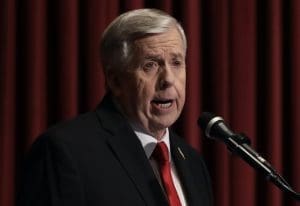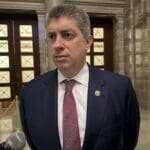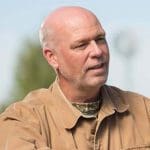GOP refusal to expand Medicaid puts rural areas at risk during pandemic
Medicaid expansion is a ‘shovel-ready program for investing in the health care of the rural community,’ Brock Slabach of the National Rural Hospital Association said.

For years, Republicans in states across the South and the Midwest refused to expand Medicaid, a health insurance program for Americans with lower incomes. Now, as the coronavirus outbreak worsens, the decisions by GOP leaders could be even more harmful to rural communities.
As the new coronavirus inevitably spreads across the country, many low-income families in states that did not expand Medicaid must “face the threat of serious, life-threatening illness of COVID-19 infection without any coverage,” Brock Slabach, executive vice president of the National Rural Hospital Association, said in a Wednesday interview.
COVID-19 is the disease caused by the new coronavirus at the center of the current global pandemic.
Republicans across the country largely opposed the 2010 Affordable Care Act, or Obamacare, which contained the option to expand Medicaid to provide health insurance to more low-income people. As a result, Republican leaders — either governors, legislatures, or both — in 15 states refused to expand Medicaid for political rather than health policy reasons.
Those states are: Alabama, Florida, Georgia, Kansas, Mississippi, Missouri, Nebraska, North Carolina, Oklahoma, South Carolina, South Dakota, Tennessee, Texas, Wisconsin, and Wyoming. Many have large segments of the population who live in rural areas.
Republicans remain in control of either the legislative branch, the executive branch, or both in all 15 of these states.
Even before the coronavirus pandemic, the decision by Republican leaders to deny health care to low-income residents had dire consequences.
More than 2 million people are uninsured in these states that could have been covered with Medicaid expansion, according to a January report by the Kaiser Family Foundation.
A 2019 report by the Center on Budget and Policy Priorities found 15,600 adults died prematurely because Republican leaders decided not to expand Medicaid in their states.
A Kaiser Family Foundation review of 400 studies on the subject found most research showed states that expanded Medicaid saw “improved access to care, utilization of services, the affordability of care, and financial security among the low-income population.”
Slabach had a recommendation for the 15 states that didn’t expand Medicaid in light of the coronavirus outbreak.
Immediately expanding Medicaid is a “shovel-ready program for investing in the health care of the rural community,” Slabach said. Doing so would give the states access to millions of dollars from the federal government for health care and make it possible for them to “give coverage to more people in the wake of this pandemic.”
Under Obamacare, the federal government would pick up almost all of the financial costs for states to expand Medicaid, yet state Republican leaders still opposed it.
The refusal impacted not only the number of uninsured residents, but also the availability of health care in those states, with dozens of hospitals closing in rural areas.
A 2018 study in the journal Health Affairs concluded Medicaid expansion in a state “was associated with improved hospital financial performance and substantially lower likelihoods of closure, especially in rural markets and counties with large numbers of uninsured adults before Medicaid expansion.”
Since Obamacare was passed, 126 rural hospitals have closed, with 70% of the closures happening in the states that have not implemented Medicaid expansion.
In January, Pinnacle Regional Hospital in Boonville, Missouri, became the seventh rural hospital in the state to shut down since 2010. Missouri’s Republican governor, Mike Parson, continues to oppose Medicaid expansion in the state.
As recently as January, Parson said Medicaid expansion was “a massive tax increase that Missourians cannot afford.”
As of Thursday, Missouri had 24 confirmed COVID-19 cases, and at least one person in the state has died from the disease.
“In a pandemic, you want to get early treatment and thorough treatment,” Slabach said. “One of the ways to do that is to provide coverage for care,” he added, calling such coverage a “necessary part of pandemic planning.”
As of Thursday, at least 10,201 people in the United States had confirmed COVID-19 cases, according to the New York Times, and at least 149 people have died.
For all Americans, no matter where they live, the Centers for Disease Control and Prevention recommends frequent hand-washing with soap and warm water, as well as other preventive measures, to curb the spread of the disease. In addition, the CDC recommended gatherings of 50 or more people be canceled for the next two months.
Published with permission of The American Independent Foundation.
Recommended

SC governor to sign bill banning hormone therapy for transgender youth into law
Treatments for youth already taking the drugs could be gradually taken off them through Jan. 31
By Skylar Laird, South Carolina Daily Gazette - May 09, 2024
Ohio Gov. DeWine said he didn’t know of millions in FirstEnergy support. Is it plausible?
Ohio Gov. Mike DeWine’s claim to not know about the millions an Akron utility spent supporting his 2018 campaign for governor simply isn’t credible, an Ohio political scientist said in a recent interview. A spokesperson for DeWine pushed back. FirstEnergy provided that support, then spent more than $60 million to pass and protect a $1.3 billion ratepayer-financed […]
By Marty Schladen, Ohio Capital Journal - April 29, 2024
Missouri governor hopeful Bill Eigel rejects affordable childcare proposal
Eigel has previously supported stripping funds from public schools and once opposed an expansion of early kindergarten.
By Jesse Valentine - April 15, 2024










































































